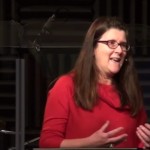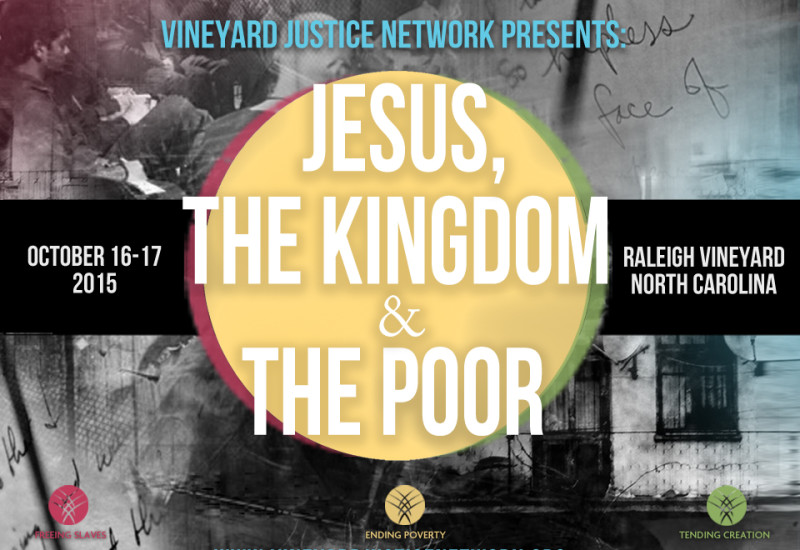The Spirit matters, The Word matters, words matter, people matter.
Today, Senior pastor Lyn Burnhope shares a deeply pastoral and thoughtful reflection on her time as a participant and panelist at this year’s VJN Forum on “Jesus, the Kingdom, and the Poor.”
It was such a privilege to be able to attend the two day conference on ‘Jesus, the Kingdom and the Poor’, which was put on by The Vineyard Justice Movement in Raleigh, North Carolina, this October.
I was very conscious that it was a long way to go, and deeply ironic that I should be spending so much money to get there, considering the emphasis was on poverty. However, it is a subject that I feel passionately about, and so just a couple of weeks before the event when the diary appeared surprisingly clear and enabling, Steve encouraged me to take the plunge and book in. The flight and the extra day before the conference gave me time and space to read and reflect, which are not things I manage very much in the normal hustle and bustle of life. It’s very easy to react to situations and people every day and not have that sense of being still and listening to the Spirit for what we should be doing and where we should be going next.
Raleigh Vineyard hosted the conference amazingly, with wonderful hospitality that enabled us to learn from each other about the things that the Holy Spirit has been doing with us and through us: rethinking Jesus’ Jubilee mission in Luke 4- working for justice amongst the homeless, the refugees, those in urban communities, those who are caught in oppressive structures like trafficking, and so the list goes on.
The first evening after worship Dr William Turner gave an exhortation to take the Spirit seriously, and unpacked some gems from John 16. He explained that traditional interpretations of the title ‘paraclete’ meaning ‘comforter or helper’ have been unhelpful in explaining the true role of the Holy Spirit. In order to be a true advocate, he explained, the word should be more understood as ‘prosecutor of the world’, who comes alongside those who need advocacy. He doesn’t just ‘help them to cope’, or ‘hug them’ through their oppression, but He draws alongside to accuse the oppressor, to reveal the truth and to bring justice and freedom. This empowering of the Spirit in the world is one which brings transformation.
The next day Kathy Maskell encouraged us to develop our hearts, hands and heads as we considered what it means to be true followers of Jesus, and Stephen Hamilton underlined how we need to consider what this looks likes particularly in the public arena. Stories of hope and healing inspired us to pick up the challenge in a greater and more effective way – not just to focus on acts of mercy towards people, but to consider the more long term and wider issues of ‘why’ this oppression exists, and ‘how’ we can change the system. Everyone has a destiny, how can we help them achieve it?
Liz Theoharis led one of the best ‘Bible Studies’ in her ‘Reading the Bible with the Poor’ seminar that I have ever been to. She didn’t teach or ‘tell’, but facilitated about thirty of us to participate in a reading and re-reading together of the parable of the persistent widow by asking pertinent questions and allowing the whole room to ponder together and respond, each bringing diverse observations and perceptions from the passage. It was very helpful to see how positively and powerfully the Bible can be accessed in a non boring, relevant and interactive way.
Liz then led the final session with some thoughts on what Jesus really meant when He said ‘the poor will always be with you’ when the disciples complained about the woman with the alabaster jar ‘wasting’ the ointment and not giving the money to the poor. Her argument was based on the context of Deuteronomy 15, where it also says ‘there should be no poor among you’. Within the provision for how the Hebrews were to live in the land were structural institutions of Sabbath and Jubilee which enabled a regular redistribution of wealth. It was only when the directives were not followed that some were cheated of justice. so ‘the poor will always be with you’ was not a sigh of the inevitable, but quite the opposite – you should not let this be happening – there does not need to be any poor in the land! Liz unpacked other Old Testament passages and also reminded us that many of these ideas would have been well known to the disciples, and therefore their understanding of this story would have been deeper than our 21st Century reading.
My personal devotional reading of this story bringing me comfort because I had washed Jesus’ feet with the extravagance of my trip to the US to seek his will for the poor might have helped my conscience about being there, but that kind of reading of scripture is not so likely to change the world. I kind of got the idea that if there was a whole church full of Liz’s, then it would not be long before poverty would be ended and the world would be a different place. In fact she and others in the Kairos movement have brought about significant change already through their advocacy, and will continue to do so even more as others like us support their initiatives.
So the time of meeting together was positive and fuelled with ‘spurring one another on to love and good works’. Big themes included: The Spirit matters, The Word matters, words matter, people matter.
I have a personal unease that I am struggling with, and I think it is that I am anxious that our liberation theology approaches are not wrongly hijacked by secular feminist intersectionality or other secular marginalized group narratives, which are based upon totally different values and aims than the gospel of love and forgiveness which Jesus championed. ‘Calling out’ privilege is often underlined with hatred, bitterness and revenge, and applied subjectively and arbitrarily to anyone who has any kind of possessions or power, no matter how hard they have worked for it. True Leadership is servant hearted, but it should still be strong leadership, and the ideal of equality does not and should not try to collapse everything and everyone to look the same. Adults should care for children, the strong should live with and care for the weak. Jesus mission was to the Tax Collector and the prostitute, but his challenge was different to each. Where oppression is blatant, our task is simplified and there should be no question about standing with the oppressed against the oppressor, but our mandate to bring freedom to the oppressed is not a double mandate to bring oppression to the free.
As pastors we are called to build communities which model unity, love, mutual care and kindness as well as sharing lives and needs. Ananias’ and Sapphira’s sin seems to have been the lie, not the fact that they did not give all the money. Once you start calling out privilege you are in danger of controlling people’s free will to give. I noticed that hidden in the Deuteronomy 15 passage is a reference to the seventh year when the slaves are set free. If they don’t want to be freed they can stay with their master, but out of choice. That’s a hard passage to explain as it seems to say that God endorses slavery, as do other passages. But surely what it is actually saying to us today is that choice is freedom. Loyalty and servanthood are not oppressive or lacking in dignity if they are chosen. Jesus showed us that.
So we have the responsibility of building churches where there is mutual love, unity and servanthood, BEING and modeling what justice should look like – nobody having any need that is not being met. If there is need and no unity in our community there can be no true worship (Amos 5). If there is no worship there is no basis for equality and justice. We are all creatures before our Creator. None is more valuable or valued. If we do this effectively, we are modeling justice to the world.
But then of course we need to go further and DO justice. Together we can do more than on our own. Those of us ‘in Christ’ must take up the challenge of poverty in a world where there is more than enough. The Trent Vineyard congregation in the UK were able to raise more than £80,000 to help the refugee crisis, and now also the Government have asked a representative from them to be part of a group of people who can speak into Parliament about the refugee situation. Because their community is significant in number, and impressively demonstrates the values and benefits of the Kingdom of God, the rest of the world not only gets blessed from them being God’s people, but is also interested in what they have to say. This is such an encouragement for us who are building the Kingdom of God within our Vineyard congregations, and should encourage us to both BE a prophetic, worshipping community and DO the works of the Kingdom, which brings justice to the oppression within our churches and in the wider world.
 Together with her husband Steve, Lyn is Senior Pastor at Aylesbury Vineyard Church in Buckinghamshire in England, and their children and grandchildren keep them busy in their spare time!
Together with her husband Steve, Lyn is Senior Pastor at Aylesbury Vineyard Church in Buckinghamshire in England, and their children and grandchildren keep them busy in their spare time!
Lyn specifically takes responsibility for their compassion ministry, with a special interest in how issues of justice work holistically within a kingdom paradigm in our worshipping communities, both on a local level and on a wider level as part of the global community.

